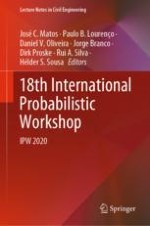2021 | OriginalPaper | Chapter
Uncertainty Assessment in Building Physics Related Problems Using Stochastic Finite Element Method
Authors : Witold Grymin, Marcin Koniorczyk
Published in: 18th International Probabilistic Workshop
Publisher: Springer International Publishing
Activate our intelligent search to find suitable subject content or patents.
Select sections of text to find matching patents with Artificial Intelligence. powered by
Select sections of text to find additional relevant content using AI-assisted search. powered by
